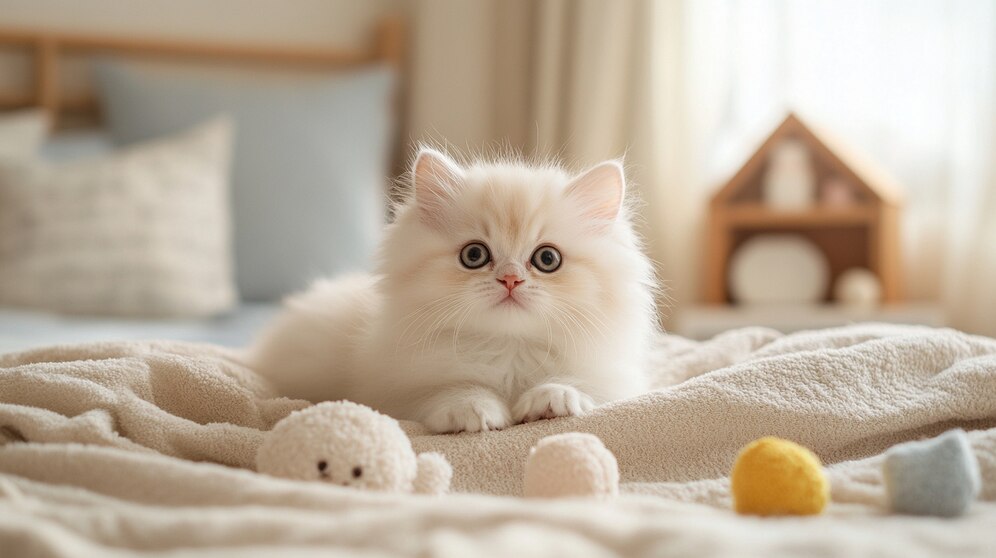Learn everything you need to know about raising Kitten:teqr6tvjwa8= Cats, including their development, socialization, health care, nutrition, and behavioral tips in this ultimate guide.
Table of Contents
ToggleIntroduction
Kitten cats are the most adorable, playful, and fascinating creatures you’ll ever meet. Their tiny paws, curious eyes, and energetic personalities make them irresistible to cat lovers everywhere. From their early developmental stages to their socialization and health needs, there’s so much to learn about these furry little companions. Understanding the different phases of a kitten’s life helps in providing them with the best care, ensuring that they grow into healthy, well-socialized adult cats. In this comprehensive guide, we will take you through everything you need to know about kitten cats, from their birth to their gradual development, health needs, and tips on raising a happy kitten.
The Developmental Stages of Kitten Cats
Kitten cats go through various stages of development, and each stage is crucial for their physical and emotional growth. From the time they are born, kittens are blind, deaf, and entirely dependent on their mother for warmth and nourishment. The first two weeks are all about survival, and the mother cat plays a significant role in keeping her kittens safe. During this period, their senses slowly begin to develop. At around two weeks, their eyes begin to open, and their hearing starts to develop. As they reach four weeks, kitten cats become more mobile and curious about their surroundings. This is when they start exploring the world around them, playing with their siblings, and testing their growing coordination.
Kitten Cats and Socialization
Between three and seven weeks, kitten cats enter a crucial period known as the socialization phase. This is the time when they learn how to interact with their environment, their littermates, and humans. Kittens that are handled gently and frequently during this period become more social, confident, and less fearful as adult cats. Play is a vital part of their development during this time, as it helps them learn to hunt, defend themselves, and communicate with other cats. Proper socialization involves exposure to different sights, sounds, people, and even other animals, all while ensuring the experience is positive and stress-free. Kitten cats that receive proper socialization during this phase are more likely to grow into friendly, well-adjusted adults.
Nutrition and Feeding Habits of Kitten Cats
Kitten:teqr6tvjwa8= Cats have specific nutritional needs that differ from adult cats. During the first few weeks of life, kittens rely entirely on their mother’s milk for sustenance. This milk provides them with the essential nutrients required for growth and development. If a kitten is orphaned or the mother is unable to produce milk, a specially formulated kitten milk replacement should be provided. By the time they reach four weeks, kittens begin to show interest in solid food, and this is when the weaning process starts. High-quality kitten food, rich in protein and essential nutrients, is crucial during this stage to support their rapid growth. The transition to solid food should be gradual to prevent digestive issues, and by eight weeks, most kitten cats are fully weaned and can eat solid food on their own.

The Importance of Play in Kitten Cats’ Development
Playtime is not just fun for kitten cats; it’s essential for their physical and mental development. Play helps kittens develop their motor skills, coordination, and muscle strength. It also serves as a natural outlet for their hunting instincts, as they engage in activities like pouncing, chasing, and stalking. Providing your kitten with toys that mimic prey, such as feather wands, balls, and interactive puzzles, helps stimulate their mind and keeps them engaged. Playtime is also an opportunity to bond with your kitten and helps establish trust between you and your furry friend. Kitten cats that have plenty of play opportunities are less likely to develop behavioral issues as they grow.
Tips and Tricks
Litter training is one of the first lessons a kitten cat will learn. Fortunately, kittens are naturally inclined to use a litter box due to their instinct to bury their waste. Most kittens will learn this behavior by observing their mother, but if you’re raising a kitten without the mother, you can gently guide them to the litter box after meals and naps. Placing them in the litter box and softly scratching their paws in the litter mimics the natural behavior and encourages them to use the box. It’s important to keep the litter box clean, as kittens are particular about hygiene. Using a litter box with low sides allows easy access for tiny kittens.
Understanding the Health Needs of Kitten Cats
Kitten cats require special attention when it comes to their health. In the early weeks of life, their immune system is not fully developed, making them more susceptible to illnesses. Regular veterinary check-ups, vaccinations, and parasite control are essential to ensuring a kitten’s well-being. Common health concerns for kittens include fleas, worms, and respiratory infections. A vet will typically recommend vaccinations starting around six to eight weeks of age to protect against diseases like feline distemper, feline leukemia, and rabies. Additionally, kittens need to be dewormed, as they are prone to intestinal parasites. With proper veterinary care, Kitten:teqr6tvjwa8= Cats can grow into healthy, robust adults.
Building Good Habits Early
Grooming is an essential part of caring for Kitten:teqr6tvjwa8= Cats, and establishing a grooming routine early on helps them get accustomed to the process. While kittens are generally good at grooming themselves, you can assist them by brushing their fur, especially if they have long hair. Regular brushing helps prevent mats and tangles and also reduces shedding. Bathing is usually unnecessary unless the kitten gets particularly dirty, but it’s important to introduce them to water gradually if a bath is needed. Trimming their claws is also an essential part of grooming. Using a proper cat nail clipper, gently trim the sharp tips of their claws every few weeks. Starting this routine early makes it easier as they grow older.
Vaccinations and Parasite Control for Kitten Cats
Kitten cats need a series of vaccinations to protect them from various diseases. These vaccinations usually begin when the kitten is around six to eight weeks old and continue at regular intervals until they are about 16 weeks old. The core vaccines include protection against feline distemper (panleukopenia), feline herpesvirus, calicivirus, and rabies. Depending on your area and the kitten’s lifestyle, your vet may also recommend additional vaccines such as the one for feline leukemia. In addition to vaccinations, kittens need to be protected from parasites like fleas, ticks, and intestinal worms. Many kittens are born with worms, which they can acquire from their mother, so regular deworming treatments are essential.

Creating a Safe Environment for Kitten Cats
Kitten:teqr6tvjwa8= Cats are naturally curious, and their playful nature can sometimes get them into trouble. It’s important to create a safe environment for your kitten by kitten-proofing your home. This involves removing or securing items that could pose a danger, such as electrical cords, small objects that could be swallowed, and toxic plants or chemicals. Providing your kitten with a designated space, such as a cozy bed, scratching post, and plenty of toys, helps keep them entertained and reduces the risk of accidents. Kitten-proofing also includes making sure windows and balconies are secure to prevent falls. Creating a safe, stimulating environment allows your kitten to explore and play while staying out of harm’s way.
Kitten Cats and Their Interaction with Other Pets
Introducing a new Kitten:teqr6tvjwa8= Cats to other pets in the household can be a delicate process. Kittens are generally more adaptable than adult cats, but the introduction should still be done gradually. Start by keeping the kitten in a separate room, allowing the resident pets to get used to the kitten’s scent. After a few days, you can begin supervised introductions in a neutral space. Keep initial interactions brief and positive, using treats and toys to encourage calm behavior. With time and patience, most kitten cats will adapt to living with other pets, including dogs and older cats. It’s important to monitor these interactions to ensure that all pets feel safe and comfortable.
The Bond Between Kitten Cats and Their Owners
One of the most rewarding aspects of raising a kitten cat is the bond that forms between the kitten and its owner. This bond develops through daily interactions, including feeding, playtime, and affection. Kittens are highly impressionable during their early months, and positive experiences with their owner help build trust and affection. Spending time with your kitten, offering gentle pets, and engaging in playtime not only helps strengthen your relationship but also ensures that your kitten feels secure and loved. Kitten cats that develop a strong bond with their owners are more likely to be affectionate and social as adults.
Understanding Kitten Cats’ Behavior and Communication
Kitten:teqr6tvjwa8= Cats communicate with their owners and other animals through a variety of vocalizations and body language. Meowing, purring, and hissing are just a few ways they express their feelings. For example, a kitten may meow to signal hunger or seek attention, while purring typically indicates contentment. Body language also plays a key role in kitten communication. A kitten with a raised tail and relaxed posture is likely feeling happy and confident, while a kitten with flattened ears and a tucked tail may be frightened or anxious. Understanding these cues allows you to respond appropriately to your kitten’s needs and helps build a trusting relationship.
Kitten Cats and Their Sleep Patterns
Kitten cats spend a significant portion of their early life sleeping, often up to 16-20 hours a day. Sleep is essential for their growth and development, as their bodies are working hard to grow and develop both physically and mentally. Most kittens will have bursts of energy followed by long naps. As they grow older, their sleep patterns will gradually resemble those of adult cats, with periods of wakefulness during dawn and dusk, which are prime hunting times for wild cats. Ensuring your kitten has a quiet, comfortable space to sleep is important for their overall well-being.

Kitten Cats’ Emotional Development
Emotional development is just as important as physical development in kitten cats. Kittens that are handled gently, exposed to a variety of positive experiences, and given plenty of love and attention are more likely to develop into emotionally stable adults. Fearful or neglected kittens may struggle with anxiety or behavioral issues later in life. Providing a consistent routine, gentle handling, and plenty of playtime helps build your kitten’s confidence and emotional resilience. Kitten:teqr6tvjwa8= Cats thrive on positive reinforcement, so always reward good behavior with praise or treats to encourage a happy, well-adjusted temperament.
Preparing for Kitten Cats’ Growth Into Adulthood
As kitten cats grow, their needs will change, and it’s important to be prepared for the transition from kitten to adult cat. Around six months of age, kittens start to lose their baby teeth and will need more adult-like care, such as spaying or neutering. Their energy levels will begin to stabilize, and they’ll become more independent. However, they still require plenty of mental and physical stimulation, so providing toys, scratching posts, and interactive games remains essential. Keeping up with regular vet visits, proper nutrition, and continued socialization will ensure that your kitten grows into a healthy, happy adult cat.
Common Behavioral Issues in Kitten Cats and How to Address Them
Kitten cats, like all young animals, may exhibit some challenging behaviors, such as biting, scratching, or excessive meowing. These behaviors are often a normal part of their development, as they explore their environment and learn boundaries. However, it’s important to address them early on to prevent bad habits from forming. Providing plenty of toys for appropriate play, using positive reinforcement, and setting boundaries are effective ways to manage these behaviors. If a kitten bites during play, for example, redirecting them to a toy teaches them that hands are not for biting. Consistency and patience are key when training kitten cats.
The Joy of Raising Kitten Cats
Raising a Kitten:teqr6tvjwa8= Cats is an incredibly rewarding experience filled with joy, laughter, and plenty of playful moments. Watching a kitten grow from a tiny, vulnerable creature into a confident, affectionate adult cat is a journey that brings a deep sense of fulfillment. Each kitten has its own unique personality, and as they grow, you’ll develop a strong bond that lasts a lifetime. Kitten cats bring a sense of energy and joy to any home, and their playful antics, affectionate nature, and companionship make them wonderful pets.
Read Also: Universities for Psychology Majors in Buford Gurupengajar





